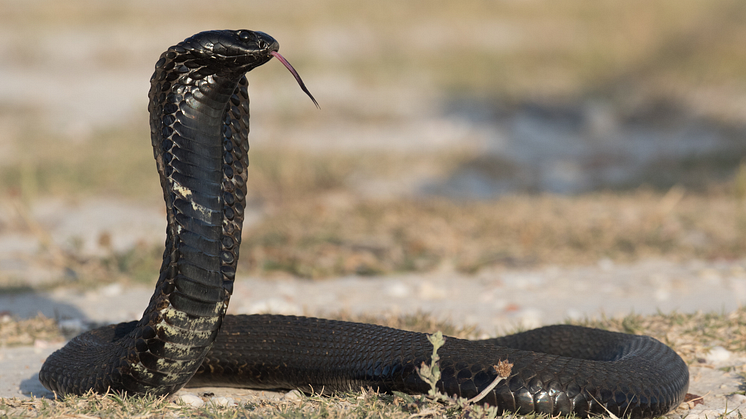
Press release -
Study reveals evidence that bacteria can live in snake and spider venoms
Newly published research led by Northumbria University shows that, contrary to what is commonly believed, the venom of snakes and spiders is actually populated with microbes, including bacteria that could cause infection in people who have suffered a bite.
For decades scientists have thought that animal venom is an entirely sterile environment due to it being full of antimicrobial substances - materials that can kill bacteria.
However, new scientific evidence from research led by Northumbria University Associate Professor in Cellular and Molecular Sciences, Sterghios Moschos and venom biologist Steve Trim, Founder and CSO of biotechnology company Venomtech, has shown that this is not the case.
The work, published today in scientific journal Microbiology Spectrum demonstrates how adaptable microorganisms are. The study provides strong genetic and culture evidence that bacteria can not only survive in the venom glands of several species of snakes and spiders, but can also mutate to resist the notoriously toxic liquid that is venom.
The findings also suggest that victims of venomous animal bites may therefore also need to be treated for infections, not just antivenom to tackle the toxins deposited through the bite.
The publication of the study follows the news that Northumbria University’s research power continues to grow with results from the Research Excellence Framework (REF2021) showing Northumbria University with the biggest rise in research power ranking of any UK university. Its research power ranking rose to 23rd, having previously risen to 50th in 2014 from 80th in 2008, making Northumbria the sector’s largest riser in research power ranking for the second time.
Challenging the dogma of venom sterility
Seeking to address a gap in research, Dr Moschos and colleagues investigated the venom of five snake and two spider species. “We found that all venomous snakes and spiders that we tested had bacterial DNA in their venom,” explained Dr Moschos.
“Common diagnostic tools failed to identify these bacteria correctly - if you were infected with these, a doctor would end up giving you the wrong antibiotics, potentially making matters worse.
“When we sequenced their DNA we clearly identified the bacteria and discovered they had mutated to resist the venom. This is extraordinary because venom is like a cocktail of antibiotics, and it is so thick with them, you would have thought the bacteria would not stand a chance. Not only did they stand a chance, they had done it twice, using the same mechanisms,” added Dr Moschos.
“We also directly tested the resistance of Enterococcus faecalis, one of the species of bacteria we found in the venom of black-necked spitting cobras, to venom itself and compared it to a classic hospital isolate: the hospital isolate did not tolerate the venom at all, but our two isolates happily grew in the highest concentrations of venom we could throw at them.”
Implications for clinical treatment
2.7 million venomous bite-related injuries occur annually, predominantly across Africa, Asia and Latin America. Of these, it is thought that 75% of victims will develop infections in venom toxin-damaged tissue, with bacteria Enterococcus faecalis being a common cause of disease.
These infections have previously been thought to be a consequence of having an open wound from the bite, as opposed to the infection-causing bacteria having come from the venom itself.
The researchers say that their study shows the need for clinicians to consider treating snakebite victims not just for tissue destruction, but for infection too, as quickly as possible.
Steve Trim of Venomtech added: “By exploring the resistance mechanisms that help these bacteria survive, we can find entirely new ways of attacking multi-drug resistance, potentially through engineering antimicrobial venom peptides.”
---ENDS---
Notes to editors:
The paper, ‘Bacterial Adaptation to Venom in Snakes and Arachnida’, is published in open-access journal, Microbiology Spectrum,an American Society for Microbiology publication. The paper and full list of authors can be found at https://doi.org/10.1128/spectrum.02408-21
About Northumbria University
Northumbria is a research-intensive modern university with a global reputation for academic excellence. Find out more about us at www.northumbria.ac.uk
About Venomtech
Venomtech Ltd is biotechnology company specialising in the utility of venom peptides in drug discovery, cosmetics and crop science. Find out more about how we purify venom peptides and exclude the unique bacterial strains found in this study at www.venomtech.co.uk
Topics
Categories
Northumbria is a research-intensive modern university with a global reputation for academic excellence. Find out more about us at www.northumbria.ac.uk --- Please contact our Media and Communications team at media.communications@northumbria.ac.uk with any media enquiries or interview requests ---












